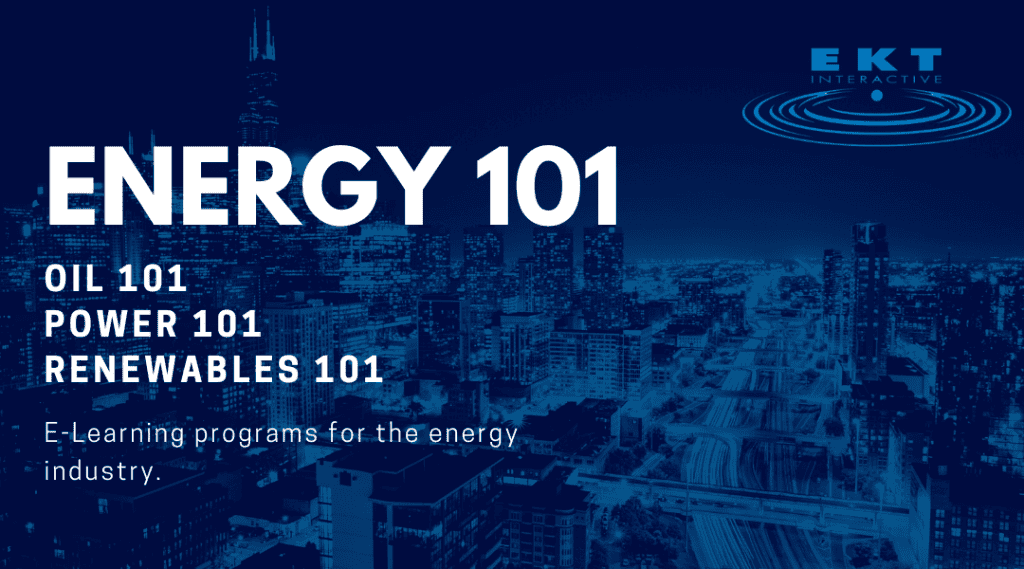Learn more with our online oil and gas training courses:

Whether it’s oil and gas, power, or renewables that is your chosen career path, our e-learning courses can help you get a leg up on the competition and get your food in the door.
We often hear from learners who successfully use our courses to prepare for the interview process. After all, you’re using the same courses that companies themselves use to prepare their teams.
As this student passed on:
I would like to thank you for your brilliant Oil 101 materials. I did use it to prepare for the recruitment process, and managed to take a new role in the oil and gas industry!
Get started with our Energy 101 courses today!
Oil and Gas Training Courses from EKT Interactive
EKT Interactive offers a variety of online oil and gas training courses.
They provide industry-focused training in various areas such as upstream exploration and production, downstream refining and marketing, and midstream transportation and logistics.
Their courses are designed to provide practical and technical knowledge to help individuals in the oil and gas industry to develop and enhance their skills.
Some of their online courses include:
- Upstream Oil and Gas Fundamentals
- Drilling 101
- Oil and Gas Production 101
- Natural Gas 101
- Oil and Gas Industry Overview
- Petroleum Refining Fundamentals
- LNG Fundamentals
- Introduction to Midstream
They also offer customized training solutions for companies and organizations to meet their specific needs.
EKT Interactive courses are available on-demand, and learners can take the courses at their own pace, allowing for a flexible learning experience.
How do I get into the oil and gas industry?
Getting into the oil and gas industry can be challenging, but here are some steps you can take to increase your chances of success:
- Research the industry: Before starting, it is essential to research the oil and gas industry to understand its operations, trends, and challenges. This will help you identify job opportunities that align with your interests and skills.
- Get a relevant degree: Most jobs in the oil and gas industry require at least a bachelor's degree in a relevant field, such as petroleum engineering, geology, or geophysics. A degree in business, finance, or economics can also be helpful for commercial and managerial roles.
- Gain relevant experience: Internships, co-op programs, or entry-level jobs in the oil and gas industry can help you gain valuable experience and develop your skills. Networking with industry professionals and attending industry events can also provide opportunities to learn and build relationships.
- Consider certification: Certifications in specific areas of the industry, such as drilling, safety, or pipeline operations, can demonstrate your expertise and make you more competitive in the job market.
- Be willing to work in remote locations: Many jobs in the oil and gas industry require employees to work in remote locations or on offshore rigs. Being willing to work in these environments can expand your job opportunities.
- Apply for jobs: Look for job postings on job search websites, industry-specific job boards, or company career pages. Customize your resume and cover letter for each position you apply for and highlight your relevant skills and experience.
Remember that the oil and gas industry is constantly evolving, and it is essential to continue learning and adapting to changes to stay relevant and competitive in the job market.
Some other online oil and gas training courses:
There are several online courses available on oil and gas that you can enroll in, some of them are:
- Oil and Gas Fundamentals: This course is offered by Coursera and covers the basics of oil and gas exploration, drilling, production, and refining. It is taught by instructors from the University of Colorado.
- Upstream Oil and Gas Fundamentals: This course is offered by Udemy and covers the fundamentals of upstream oil and gas operations, including exploration, drilling, and production.
- Introduction to Petroleum Geology: This course is offered by edX and provides an overview of petroleum geology, including the processes that lead to the formation of oil and gas deposits.
- Fundamentals of Reservoir Engineering: This course is offered by PetroSkills and covers the principles and practices of reservoir engineering, including reservoir performance analysis, well testing, and reservoir simulation.
- Oil and Gas Industry Operations and Markets: This course is offered by Stanford Online and covers the global oil and gas industry, including its history, structure, and economics.
- Petroleum Engineering: Reservoir Engineering: This course is offered by the University of Texas at Austin and covers the principles and practices of reservoir engineering, including reservoir performance analysis, well testing, and reservoir simulation.
- Oil and Gas Drilling Fundamentals: This course is offered by Udemy and covers the basics of drilling operations, including drilling equipment, well design, and drilling fluids.
- Petroleum Refining and Petrochemicals: This course is offered by Coursera and covers the refining and processing of petroleum products, including the production of petrochemicals.
These are just a few examples of the many online oil and gas courses available. It's important to do your research and find a course that meets your specific needs and interests.
Related Resources
Energy Risk Management
Risk Management in Oil and Gas
Oil 101
Power 101
What is a Nuclear Power Reactor Operator
Watts, Kilowatts, Megawatts, Gigawatts
Jobs Data
Global Energy Talent Index (GETI)
US Energy & Employment and Jobs Report (USEER)
Career Path in Energy Articles
Is Oilfield Services/Equipment a Good Career Path
Is Oil and Gas Production a Good Career Path
Is Electric Utilities a Good Career Path
Is Power Generation a Good Career Path